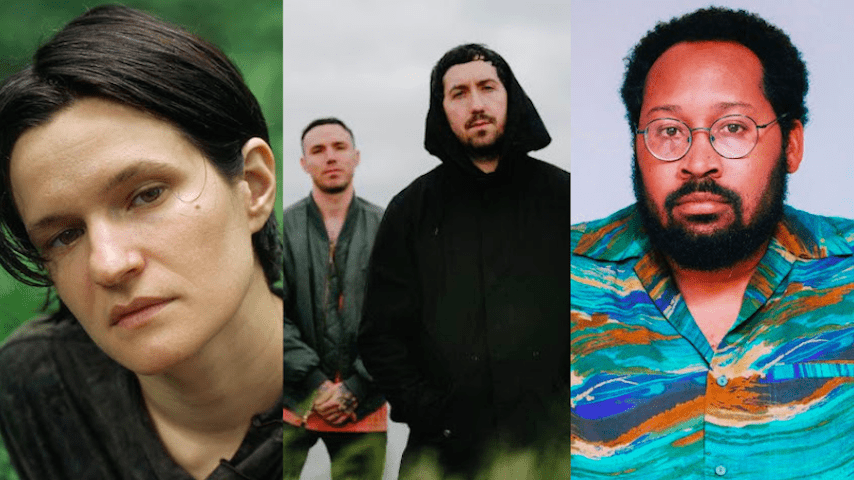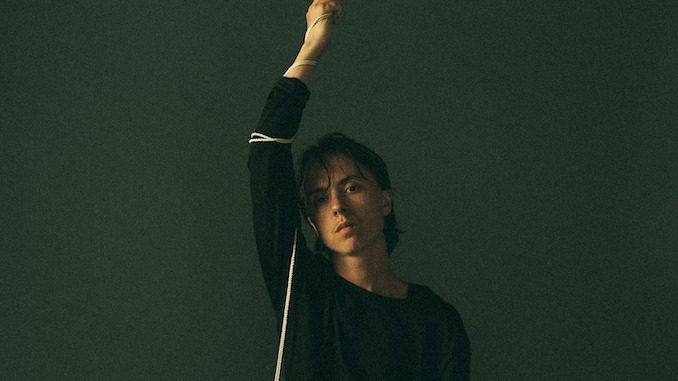If you manage to peel yourself away from the news at some point soon, consider seeking solace in great new music. All of our favorite albums from October are either fiercely cathartic, gently comforting or a combination of the two. This past month saw albums from legends like Bruce Springsteen, plus some of today’s most exciting new artists: Ela Minus, Bartees Strange, Helena Deland and more. Scroll down to sample the 10 best albums from October.
10. Helena Deland: Someone New
We had the pleasure of seeing Montréal’s Helena Deland open for Connan Mockasin at the 2019 Montréal Jazz Festival, where Deland’s deft lyricism and sonic edge left a lasting mark. For her debut album, she’s signed to Chris Cantallini’s (of timeless indie blog Gorilla vs. Bear) Luminelle Records, and her dreamy sound slots nicely next to labelmates like Anemone, Hana Vu and Jackie Mendoza. On songs like “Someone New” and the spectacular “Truth Nugget,” Deland expands on themes of interpersonal dynamics and identity in powerful ways. She is undoubtedly one of the best new talents to emerge from the robust Montréal indie scene. —Adrian Spinelli
9. Kevin Morby: Sundowner
After five solo albums, Kansas City singer/songwriter Kevin Morby hasn’t missed a beat, and his sixth entry Sundowner continues that hot streak. Sundowner is perhaps less ambitious than his 2019 double album and spiritual escapade Oh My God, but any time Morby invites you on a lowly, dusty folk rock journey, you better get moving because it’s always worth it. If you’ve had the pleasure of becoming acquainted with Morby’s vocal, melodic and guitar quirks, you’ll find many of those here, along with his breathtaking intimacy and thoughtful pastoral tales. —Lizzie Manno
8. Alexia Avina: Unearth
Alexia Avina has a restorative voice, and her previous album All That I Can’t See was an ambient folk fan’s dream. She’s now released her third album Unearth, which is more fleshed out than its acoustic predecessor, but still satisfyingly layered and wispy. It’s also a breakup album—one that grapples not just with the initial resentment and anger, but the lingering existential questions that will remain for a lifetime (“Came in like a raging comet / And I was on the other side of it / Where are all the other roses / And who decides when we’re unfrozen?”). Unearth isn’t background music—it’s a gorgeous inner retreat. —Lizzie Manno
7. Bruce Springsteen: Letter To You
There’s something to be said for songs that do exactly what you think they’re going to do, in the best way possible. Bruce Springsteen’s new album is full of them. Letter to You follows fast on the heels of Springsteen’s cinematic 2019 release Western Stars, but while the latter was a solo effort, Springsteen’s latest reassembles an E Street Band in peak form on nine newly written songs and three he’s had kicking around since before his 1973 debut. The musicians recorded the album in just five days last November at Springsteen’s home studio in New Jersey, playing almost everything live to tape—a throwback to the way they used to work. In another break with years of precedent, Springsteen didn’t make demo recordings outlining his rough ideas for musical arrangements. Instead, he played through the songs on an acoustic guitar in the studio, and then he and the band set about arranging and recording them. That more spontaneous approach turns out to have been crucial: By giving the E Street Band full rein to play like, well, the E Street Band, Springsteen ended up with his most E Street-sounding album since Born in the U.S.A.. —Eric R. Danton
6. Open Mike Eagle: Anime, Trauma and Divorce
Open Mike Eagle’s Anime, Trauma and Divorce is teeming with anguish and rumination, all underpinned by his nimble wordplay, rich vocals and clear enunciations. It’s peppered with artful textures and a relaxed pace—a perfect frame for his sharp lyricism. According to Eagle, the album is about a time when “the world went to shit [but] I was already in the middle of a few personal crisis,” and you can hear those explorations of micro and macro turmoil. His lyrical references are second to none, lending nods to The Breeders, X-Men, Peter Dinklage, the ‘93 Bulls, masked wrestlers, and anime like JoJo’s Bizarre Adventure and Neon Genesis Evangelion. His personal conundrums are also extremely rooted in the times, like his desperate turn to self-care (“Wtf is Self Care”) and the cracks of his real-life marriage revealing themselves while watching an episode of Black Mirror (“The Black Mirror Episode”). —Lizzie Manno
5. MOURN: Self Worth
Barcelona trio MOURN released their latest album Self Worth via Captured Tracks. It’s their fourth album, and it follows 2018’s Sopresa Familia, which was characterized by the seething anger they felt after being manipulated by their previous record label. Self Worth is imbued with a similarly intoxicating vigor and celebration of each other, but it also has a cool confidence, and both melodic ease and intrigue. With an approach to rock and post-punk that’s both straightforward and unusual, MOURN remain one of the most underrated bands going. —Lizzie Manno
4. Ela Minus: acts of rebellion
As 2018 ended and 2019 began, Ela Minus was putting the finishing touches on what would become the most prescient song of 2020. “We’re afraid we’ll run out of time / To stand up for our rights / You won’t make us stop,” the Brooklyn-via-Bogotá synth savant murmurs invitingly on “megapunk,” which finds a brooding-then-explosive middle ground between New Order and Aphex Twin. Before the song’s final chorus, she becomes even more direct: “You’re choosing to lead us apart, but against all odds,” she warns, “you still won’t make us stop.” As the apex of an album released 11 days before the 2020 presidential election, “megapunk” couldn’t be more timely. It’s an uncompromising reminder that if the current president and his cronies attempt the coup they’re all but promising, we need to rise up even if we face threats of violence and jail. It’s also, as the second single and most thrashing entry on an album named acts of rebellion, somewhat of a thesis statement. On her debut LP, Ela Minus explores the role of community in subverting both fascist governments and oppressive everyday expectations. It’s a prophetic, vital message, and it’s wrapped in some of the best electronic and pop music of the year. —Max Freedman
3. Bartees Strange: Live Forever
We live in an era when intersectionality is either fiercely celebrated or rejected, and Spotify playlists are the norm—especially for young music listeners. These conditions are perfect for an album like Live Forever by Bartees Strange, a Brooklyn musician whose work is a tapestry of traditions, ideas and sounds. Strange throws curveballs throughout Live Forever’s 11 tracks, but they never seem out of place. Atmospheric soul bookends the album, a style in which Strange excels, but there’s plenty to be surprised and delighted by in between. Promo singles “Mustang” and “Boomer” harness a visceral power, with the former diving into hooky synth-rock and sweltering punk, and the latter dishing out hip-hop verses and giddy blues-rock. Only three tracks in, it’s obvious that Strange’s good-natured charisma and vocal warmth are something special. You can hear the rootsy blues of Black Pumas, the genre-hopping grandeur and vocal dynamism of Moses Sumney, the southern rock cadence of Kings of Leon and the punky explosiveness of At The Drive In—and that’s only the beginning of Strange’s reference points. —Lizzie Manno
2. Adrianne Lenker: songs
Adrianne Lenker appeals to the warm and fuzzy in ways that aren’t just low-hanging fruit. Her unusual vocal stylings (which have proved more influential than ever) are a godsend, and her poetic imagery—sometimes dainty and sometimes harsh—evokes the very best of comforting storytelling. On songs (also accompanied by an instrumentals album), Lenker brings the wonderfully detailed lines that also make Big Thief such a magical group (“Wind that howls like a hound / Wind that laughs like a clown … Candescent insects / Crosses and fishnecks”), while offering more stripped-down arrangements. —Lizzie Manno
1. Nothing: The Great Dismal
On their fourth album The Great Dismal, Philadelphia shoegaze outfit Nothing triumph with both bold and subtle sounds. The band have always excelled at details and dynamics, and they deliver here without fail. The final passages of opening track “A Fabricated Life” really cement the album’s prodigious and intimate themes: “Long before the fall / Did we have it all along? / Sing the same old songs / Beat the same old tired drum / But what else can I ask for? / I’m nauseous from the ride / Degeneration in the wind / A fabricated life.” These moods of erosion, numbness and uncertainty pervade the album, and their mythical soundscapes bolster the weight of these feelings and elevate their sense of urgency. The Great Dismal watches as humanity is put through the wringer and responds with godlike, pummeling guitars and metaphorical, emotionally revealing lyrics. One minute, they’re contemplating themes of love, reason, perception and death on a grand scale, and in simple terms, and the next, they’re marveling at people’s reaction to rain (“Isn’t it strange / Watching people / Try and outrun rain”). It’s a sweltering expulsion of anxieties and a thoughtful chronicling of our species’ downfall. —Lizzie Manno




